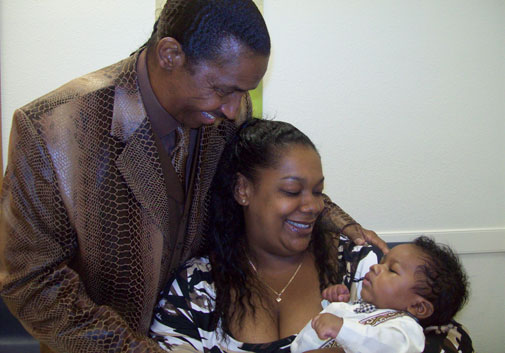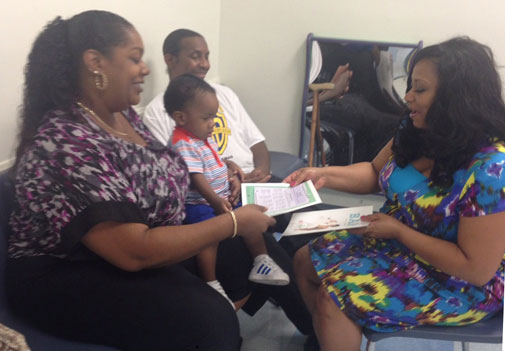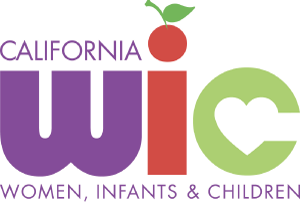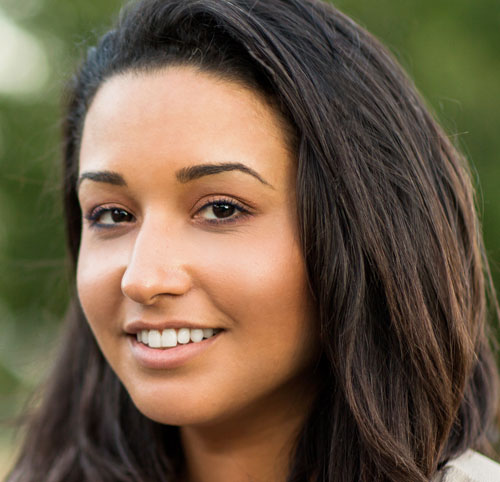
Serious complications! Dakora Robinson’s husband, Ricky Green, went into the hospital for a simple procedure.
But Ricky had serious complications. Dakora helped him in every way she could. It took a long time, but Ricky got better.
Today she says, “It was crazy!”
Soon after Ricky recovered, they received wonderful news. Dakora was pregnant!
Joyous moment! “Ricky grabbed me and hugged me!” she said.
Enrolling in WIC They wanted Dakora and the baby to be healthy. So they did everything they could. Dakora made sure she ate healthy foods. And she enrolled in WIC at the Lynwood WIC Center early in her pregnancy.
Dakora also enrolled in the Loving Support Program.
Loving Support is a special program where WIC moms have a personal breastfeeding peer counselor. The counselor keeps in touch with them throughout their pregnancy and after the baby is born. The peer counselors give them extra breastfeeding support by phone and in person. This program is in addition to the breastfeeding education and support that each of our WIC moms receives.
Committed to breastfeeding Dakora’s counselor was Andea Barnes. When Andea phoned Dakora, Ricky got on the phone too. Andea learned that both of them were very interested in breastfeeding. They knew how valuable breastfeeding is. “Ricky is so supportive,” Andea said.

Andea phoned Dakora many times while she was pregnant. Andea wanted to see how Dakora was doing and answer her breastfeeding questions. During the last month of her pregnancy, Andea phoned her once a week. Breastfeeding peer counselors do this with all their Loving Support mothers.
Dakora and Ricky phoned Andea too. They also attended breastfeeding classes at their WIC center.
Dakora and Ricky expected that the birth and breastfeeding would go smoothly. But they didn’t.
Determination and support Most women don’t have experiences like Dakora’s. But Dakora’s story shows us that even when a woman’s situation is difficult, breastfeeding can work. The support others give her, and her own decision to keep trying make a big difference.
Dakora never went into labor. By early April, the doctor became concerned. The baby was full-term, but Dakora wasn’t dilating. Dakora and Rick went to St. Francis Medical Center, and the doctor performed a C-Section. This was not what Dakora and Ricky expected!
Dakora gave birth to an 8 lb. 10 oz. baby boy. They named him Isaac. Their baby was exactly what Dakora and Ricky had hoped for. He was healthy and adorable. Ricky called Andea to tell her about Isaac’s birth.
Challenging times ahead But Dakora’s C-Section made her uncomfortable. And breastfeeding was tremendously painful.
Breastfeeding is comfortable for most moms. But Isaac wasn’t latching on properly. Dakora’s large breasts made nursing more challenging, and the new baby wasn’t nursing as well as she’d hoped.
Dakora thought that because she had large breasts, she should hold the baby in the “football position.” “But that wasn’t working,” Dakora said. “I was in such pain.
“In the hospital–I guess my hormones were raging. The hospital’s breastfeeding lady had her hand on my breast, my husband had his hand on my breast. Everybody was touching me. Everything was new to me. They were grabbing my baby. I thought ‘Please everybody,’ just leave me alone!'”
Two days after Isaac was born, Ricky was worried. He called Andea again.
Andea spoke to Dakora. Andea explained that the hospital’s lactation consultant was doing exactly what Dakora needed. The consultant was trying to teach her about how to position the infant.
“I told Dakora that the lactation consultant could help her better than me, because she was there in person and I was not.
Support a phone call away ”I reminded Dakora that I was only a phone call away. I told her that I would always be there for her. I would support her.
“Dakora’s breasts were hurting a lot, and she was afraid,” Andea said. “I explained that the hospital’s lactation consultant could help her with the pain. This seemed to calm her.”
But there were two problems. The baby had low blood sugar, and Dakora’s nipples were cracked and sore. So the doctor prescribed formula for the baby. “When they started giving him formula, I started crying,” Dakora said.
Then Dakora began to experience even more problems.
She wasn’t nursing Isaac, and after a few days, her breasts became engorged. She was not “letting down” her milk, and she felt a lot of pressure. This was painful!
She used a manual breast pump to remove some milk and relieve the pressure in her breasts. She thought this would help her feel better. But she already had sore, bleeding nipples, and this made them feel even worse.
Thank goodness for Andea’s suggestions! Andea suggested that Dakora use hand expression. Dakora used her hand to massage her breasts and release some milk. This worked much better. Andea told her to gently rub breastmilk on her nipples to help them heal faster. And she told Dakora about nipple cream and warm compresses.
Dakora was still in the hospital. The weekend seemed to last forever.
WIC Breastfeeding Helpline Over the weekend, another WIC breastfeeding peer counselor called Dakora to ask how she was doing. This peer counselor was staffing our Breastfeeding Helpline.
All mothers who have questions and concerns can call the helpline. They will talk to a breastfeeding peer counselor who has advanced training. Breastfeeding peer counselors answer calls during normal business hours, most evenings and some weekend hours.
Dakora was still in pain. But she continued trying to breastfeed anyway. When she, Ricky and Baby Isaac left the hospital several days later, Dakora was “combo feeding.” Sometimes she would bottle feed, and sometimes she would breastfeed.
During the first week back at home, most of the time she bottle-fed Isaac rather than breastfeed him. But Dakora’s nipples were healing, and by the second week, she noticed some improvement.
“Let’s try! Let’s try!” Ricky was very supportive. He wanted her to breastfeed. “Let’s try. Let’s try,” he said. She began to breastfeed the baby more often, and her nipples continued to heal.
“At home I was still giving him a bottle sometimes, but it didn’t feel right. Besides that, he didn’t like the formula, and I couldn’t stand the smell!”
After Dakora and the baby had been home for two weeks, the family went to the Lynwood WIC Center. A breastfeeding class was just about to start.
From difficult to easy During the class, two breastfeeding peer counselors placed a pillow on Dakora’s lap and laid Isaac on top of it. When he latched on, Dakora’s breast didn’t hurt at all. They also showed her how to relax her entire body. “Where have you been all my life?” Dakora asked.
“I came home, and I began using that position. Suddenly breastfeeding was so easy.”
More help from Andea! But Dakora still didn’t feel secure enough to stop the bottle feeding all at once. Andea suggested a plan, and Dakora followed her suggestions. Each day Dakora gave the baby one less bottle and breastfed more. By the time Isaac was one month old, Dakora was exclusively breastfeeding. No more bottles!
The Loving Support Program lasts for six months. During those six months, Andea called Dakora and Ricky many times, and they phoned her when they had questions.
That next January, Isaac turned nine months old. “It was a joy watching him develop. Watching him try to walk. Holding onto the coffee table, the sofa. Watching him learn to do things. He called Ricky ‘Da Da’, and he called me ‘Na Na.’ I was able to stay home with him. It was a blessing.”
Dakora continued to breastfeed Isaac. Some women are comfortable nursing in public, but she wasn’t. Instead she planned ahead and nursed Isaac at home before taking him out in public.
“Mommy milk” Dakora and Ricky noticed that breastfeeding affected Isaac’s mood. “It seemed like the breastmilk was an ‘attitude fixer’. Once he got his ‘mommy milk,’ he started smiling and playing again like nothing happened.”
Dakora praises her husband: “He’s a big help. When Isaac was a baby, I would take care of Isaac for about two hours. Then he would keep Isaac for about two hours. We had to switch duties so I could get things done! I don’t know what I would have done if Ricky had passed away at that hospital.”
Loving WIC Dakora praises WIC: “I love everything. I utilize everything I need at WIC.” Besides taking advantage of Loving Support and the Breastfeeding Helpline, Dakora and Ricky spoke with the breastfeeding peer counselor at their WIC center and attended breastfeeding classes there.
“Dakora and Ricky are a joy to work with,” Andea said. “Everyone at the Lynwood WIC Center says they’re wonderful. Ricky and Dakora are part of what makes their job a joy. These parents want to receive health information. They welcome learning about nutrition and health. They use all the WIC services.”
Important bond Dakora’s Loving Support services were over when Isaac turned six months old. But Dakora continued to call Andea with questions of all kinds. She asked Andea questions about teething, mood changes and table foods. And Andea welcomed her calls. After all, they shared an important bond.


